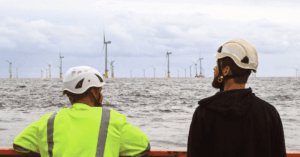ISWAN Releases Guide To Support Seafarers’ Wellbeing During Zero-Carbon Transition
Driven by the findings of an industry-wide survey last year, the International Seafarers’ Welfare and Assistance Network (ISWAN) has produced a guide providing practical ways to support seafarers’ wellbeing during the zero-carbon transition.
In the rapid pursuit of decarbonisation and technological change, the fundamental burden for implementation of new technologies falls squarely on the seafarer. With a lack of awareness in the industry about the impact on seafarers’ wellbeing and job satisfaction, ISWAN conducted a survey in 2023 of 400 seafarers and 55 shore-based staff around the world. In a report published last year and sponsored by The Shipowners’ Club, ISWAN shared its findings that although many seafarers were supportive of the aims of decarbonisation and willing to be active contributors, the rapid technological changes and regulatory regimes were having a substantial impact on workload, fatigue and stress levels at sea. Concerns were also raised around potential criminalisation in the event of alleged breaches of new rules and regulations.
The report highlighted the need to proactively plan for a seafarer-centred approach to the zero-carbon transition. Skilled, trained seafarers are vital to ensuring the maritime sector meets its environmental obligations, but if the costs to their wellbeing become too high, seafarers may leave, contributing to the sector’s growing recruitment and retention crisis.
ISWAN’s new guidance sponsored by The Shipowners’ Club, Taking a seafarer-centred approach to decarbonisation: Guidance for seafarers and maritime stakeholders, provides practical ways in which seafarers can support their own wellbeing and that of fellow crew during the zero-carbon transition, and in which the maritime sector as a whole can foster environments that are supportive of seafarers’ wellbeing and protective against the risks posed by rapid technological and regulatory change.
The guidance, written by Dr. Chris Haughton FNI FIMarEST FSET, emphasises the importance of valuing seafarers as experts and partners, and strengthening communication about technological change as part of a ‘whole organisation’ approach to connect ship and shore. It also offers practical suggestions to help maritime stakeholders understand and plan for the impact of ‘technostress’ on safety at sea – defined as ‘anxiety, tension, or distress caused when a person is overwhelmed by new technology…occurring when they are unable to adapt and learn to use technology in a healthy, productive way’ (Brod, 1984).
Addressing the need for an effective safety culture, ISWAN’s guidance provides practical steps that maritime companies can take to invest in seafarer-centred working practices, such as reviewing crewing models to tackle fatigue, and prioritising psychological safety so that seafarers feel able to raise concerns or questions and have sufficient mechanisms to do so.
Overall, ISWAN’s guidance illustrates the need for holistic thinking to build the working cultures and practices that will enable the sector to successfully recruit and retain the skilled professionals it needs to ensure a safe, equitable and sustainable transition to zero carbon.
Simon Grainge, ISWAN’s Chief Executive, said: ‘As the pace of decarbonisation accelerates, it is essential to ensure that the additional demands that rapid technological change places on seafarers are not overlooked amidst the pressures to meet regulatory requirements. Particularly with the advent of alternative, more hazardous fuels, providing training to upskill seafarers is only one angle of the preparations for zero carbon that the sector needs to prepare for. Taking a proactive approach to building psychological safety will also be fundamental to ensuring a sustainable future for the sector, in both human and environmental terms.
‘Many seafarers understand only too well the vital need for decarbonisation and are keen to play their part. There is a real opportunity for maritime stakeholders to capitalise on this motivation by partnering with seafarers as crucial drivers of the decarbonisation transition.’
Louise Hall, Director of Loss Prevention, Corporate Responsibility & Marketing at The Shipowners’ Club, said: ‘The Club is pleased to support ISWAN’s latest guidance, which places seafarers at the heart of the industry’s decarbonisation efforts. As the maritime industry is constantly evolving, it is critical that the welfare of those at sea remains a central focus. Seafarers play a pivotal role in achieving global sustainability goals, and it is our collective responsibility to ensure they are equipped, protected, and supported throughout this transition. This guidance is a valuable resource in fostering a safe, resilient, and inclusive working environment during a time of significant industry change.’
Taking a seafarer-centred approach to decarbonisation: Guidance for seafarers and maritime stakeholders can be downloaded on the ISWAN website here.
Press Release

